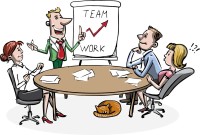- Home
- Business Processes
- Industry Knowledge
- Aerospace Industry
- Automotive Industry
- Banking Domain
- BFSI Industry
- Consumer/ FMCG Industry
- Chemicals Industry
- Engineering & Construction
- Energy Industry
- Education Domain
- Finance Domain
- Hospitality Domain
- Healthcare Industry
- Insurance Domain
- Retail Industry
- Travel and Tourism Domain
- Telecom Industry
- Leadership Skills
- eLearning
- Home
- Leadership
- Problem Solving
- What is Project Management
What is Project Management
Are you leading or involved in projects that are critical to your business or your team or your organization? What are the challenges you face while managing these projects? Do you feel yourself to be in control of the project and are able to track all deliverables to get successfully completed by the deadline? Do you have methodologies, clear processes, and systems in place to manage your projects? Are your projects able to meet the business objectives they intended to achieve?
This section of our website is targeted at individuals who manage projects as a primary function of their work. Continue with these tutorials to gain an operational understanding of the basic concepts and tools of project management as well as advanced tools to manage the real-world challenges you will face. We will start with the basic concepts and tools and slowly move to advanced topics improving your project management skills.
We will address the core concepts behind “Project Management” and help you navigate through the real-world challenges and troubleshoot problems that may be affecting your project team’s performance and work. We will give you tools to deal with miscommunications, conflicts, or sagging loyalties that get in the way of high performance. We will also give you an opportunity and toolkit to put those concepts into practice during the learning sessions.
Some of the objectives that we have tried to address while creating these tutorials are:
1. Exposure to real business projects with high business impact
2. How to create a well-defined project with clear deliverables
3. Tools and concepts behind defining project scope, detailed guidelines
4. Moving from theoretical concepts to a great learning experience
5. Short and precise structured course output
6. Exposure to best practices and good use of project management tools
7. How to leverage very good teamwork during projects
8. How to ensure the impact of the project on pre-defined business objectives?
9. Ensuring that the participant learn & apply project management tools & techniques
10. Time & commitment impact – for the participant, you and for your team
11. Impact of learning on your role - does participant is able to apply some of the skills & knowledge learned on actual job
12. Developing people and ensuring the learning has an impact on the performance
13. Help participants better understand the strategy & challenges of their own businesses
14. Tools to make people aware of cultural differences between geographies/businesses
15. Enhancing the ability to see the big picture
16. Increased hands-on knowledge & understanding of other functions within the organization
17. Understand the power of best practice sharing - “participant will start looking for connection within the business before doing things by himself”
18. International best practices that can be applied in business projects
19. Guidance on applying tools & knowledge
20. Increased self-confidence - “Participant is now able to voice her opinion & challenge others in the meeting. He/She drives project more proactively”
21. An eye-opener on a variety of career paths “participant is realizing there are other options available for them than a current role for her next move”
22. Noticeable improvement in leadership skills
23. The participant is using the new network to get fresh ideas/advice
24. The project gave visibility & exposure to the participant
25. Developing presentation skills
26. Tools to evaluate what can be done differently
27. Practical, real-world project management examples (Customer Focus)
28. Career Benefits - More & wider responsibilities within the same department; New role (lateral move, promotion); Move to the management role
29. Make participants aware that the higher they go, the more they will have to work on things in parallel
30. How do you manage everything; how do you set priorities, resources, etc.?
31. Prepare participants for bigger roles; How to deal with uncertainty?
32. Other areas of development - Teamwork … collaboration…
Related Links
You May Also Like
-
In our present Hitech scenario, society is changing very fast. What are the skills that are most relevant for leaders in relation to the changing economic environment? Leaders need to develop skills to drive innovation and change in order to play a more central role in their organizations’ activities. How do managers accept the change and meet business expectations by becoming a key figure in driving change and innovation?
-
Team Development by Building Trust
As your team begins to work together, you need to establish a way each team member can exchange ideas and build mutual trust. Successful groups are built on trust and collaboration. A free exchange of ideas, in an open environment, will allow your team to get to know each other and enable you to check on how they work together. Learn some tips to help build team trust and establish personal bonds.
-
Communication has as its central objective the transmission of meaning. The process of communication is successful only when the receiver understands an idea as the sender intended it. How does a message or an idea travel from one person to another? To transmit our message, we engage in a sensitive and complex process of communication, with different elements like sender, message, channels, receiver, noise, and feedback.
-
In its simplest sense, decision-making is the act of choosing between two or more courses of action. Decision making is a key skill in the workplace and is particularly important if you want to be an effective leader. When decisions have to be made, there are several stages that you should go through to reach a practical solution. Understand the meaning and importance of decision making and how to look at it as a process.
-
Many different types of teams have been identified by social scientists. Managers may encounter the diverse types of challenges while managing different kinds of teams. Challenges associated with Cross-Functional Teams might be different from that of a Geographically Dispersed Team or a Virtual Team. This article explores some common categories and subtypes of teams.
-
Reasons behind Wastage of Time
Under-utilization of time may be due to the faulty system or faults of manager/officer/leader or due to lack of planning. There could be many factors driving the procrastination behavior like system issues, personal work habits, and lack of delegation, personality traits, and bad working habits of the leader, failure to tackle interpersonal conflicts, obstacles, and lack of far-sightedness.
-
Change is a complex phenomenon. There are different types of changes that are going on around us. Listed in this article are twelve areas in which change arises and bring some classification to it. However one may classify the change, the various heading is always interrelated. The change could be triggered by market changes, technological changes, or organizational changes.
-
Laissez-faire is a style of leadership that affords the group members a great deal of independence. Tasks are delegated to the group members and they are responsible to see the project through to fruition. Research has shown that this style of leadership leads to the lowest levels of productivity. This article explains this style and covers the implications of having a hands-off approach and the situations where this style could be effective.
-
Charles Darwin had once commented that “It is not the strongest or the most intelligent who will survive but those who can best manage change.” Agility means the capability of rapidly and efficiently adapting to changes and recently, agility has been applied in the context of software development, agile enterprise, and agile leadership. Agile leaders play an important, even essential, role in scaling agility in an organization. Understand how being an agile leader helps in effectively catalyzing organizational change.
-
Tools for Developing Your Team
If a manager has too many weak spots in the talent of the team, the ability to empower the team members to independently execute the project is impaired. Assignments fall behind schedule or stretch out because the needed skills or knowledge are not in place when needed. To successfully execute important projects, hiring talented people, and increasing the talents of existing staff are most important.
-
How often do you have a plan for how you are going to spend your day but you aren't able to complete the tasks on your plan because of unimportant tasks, interruptions, or your own procrastination? Wouldn't it be great to be able to manage your schedule and your time while avoiding, or at least controlling, these time stealers? Learn the strategies to manage your schedule while still handling interruptions and demands on your time.
-
Leadership has been defined in different ways by different sets of scholars. In very simple terms leadership can be defined as the skill of a person to influence an individual or a group for achievement of a goal in a given situation. One can use different dimensions and perspectives to define leadership. Through the evolution of leadership thought, leadership has been defined in various ways discussed here.
-
Many people think communication is easy. It is said that communication can never be a hundred percent complete. Many factors are involved in the process of communication and something can always go wrong with one or more of these. It becomes difficult and complex when we put barriers in communication. Recognize barriers to interpersonal communication and examine specific strategies for overcoming those barriers.
-
Building Perfect Creative Team
One misconception around creativity is that creative act is essentially solitary. Most of the world's important inventions resulted not from the work of one lone genius, but from collaboration of a team with complementary skills. Managers should build teams with the ideal mix of traits to form a creative group and then establish the conditions that make creativity much more likely to occur.
-
In this study of power, Raven identified five bases of power as coercive, reward, legitimate, referent, and expert. The 5 Types of Power can help you decide when it is appropriate to use a particular type of power in important situations. Leadership involves authority and it is very important for leaders to understand what type of power they're using.
Explore Our Free Training Articles or
Sign Up to Start With Our eLearning Courses

About Us
Learning
© 2023 TechnoFunc, All Rights Reserved















